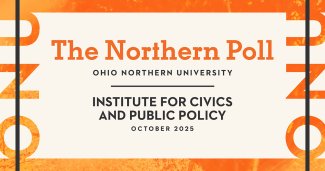
The Institute for Civics and Public Policy (ICAPP) at Ohio Northern University has released the Northern Poll, a survey of Ohioans dedicated to providing cutting-edge insights on public opinion on “backyard issues.” This poll covered four zoning issues: solar farms; multi-family housing; marijuana/cannabis dispensaries; and AI/data centers.
“We often hear about kitchen table issues, but zoning issues are critical backyard issues,” said Dr. Keith Durkin, professor of sociology and director of ICAPP. “The character and makeup of neighborhoods and communities are greatly impacted by how state and local governments regulate land use and development.”
The October 2025 poll was the largest yet, surveying 1,638 Ohio adults from October 7 through October 13. The margin of error for this research project ranges from 3.1% to 5.1%, depending on the question. Full results can be found here.
Durkin and Dr. Brian King, assistant professor of political science and faculty associate at ICAPP, and Gabriel Mott, a senior majoring in statistics and political science and ICAPP Fellow, led the project in collaboration with SurveyUSA.
“Public opinion matters,” said King, “and these results will inform policymakers throughout the state about what their constituents want and why.”
Broad support for solar farms
Solar farms (areas of land with a large number of solar panels to generate electricity) are broadly popular. 55% support them (25% strongly, 30% somewhat); while only 19% indicated opposition (11% somewhat, 8% strongly).
Examining attitudes on how solar farms would impact each of the following in their community on a scale from very negative to very positive, and creating a Net Positivity score by subtracting negative reactions from positive ones, scores are similar across each item: +37 on the local economy, +36 on the environment, +36 on quality of living, and finally +30 on public safety.
“Solar farms appear to be broadly supported, with Ohioans generally having a favorable impression of their community impacts,” Durkin said.
Support for multi-family housing
Multi-family housing (apartments, condominiums, townhouses) again yielded positive responses, albeit to a lesser extent, with +19 Net Support. 45% support (16% strongly, 29% somewhat); 26% are opposed (17% somewhat, 9% strongly).
Multi-family housing is seen as having a broadly positive net impact on communities' economies (+32), and a lesser but still significant +22 positive impact on the environment. Quality of living, however, at +13, and public safety, at +7, appear to be areas of possible concern.
"Overall, most Ohioans see the positive economic benefits of multi-family housing, but that support begins to drop off when considering its impact on quality of life and public safety, King said. “This is especially true for those over 65, those making over $100,000 annually and conservatives."
Support for marijuana/cannabis dispensaries
Marijuana/cannabis dispensaries drew positive responses with +19 Net Support. 47% support (24% strongly, 23% somewhat); 28% are opposed (14% somewhat, 14% strongly).
Dispensaries are seen as having a positive impact on the economy at +42, and to a lesser extent, quality of life (+12). On the other hand, respondents see public safety as a liability with a net score of -7.
"There is overall support for cannabis dispensaries in Ohio, especially when it comes to their economic impact, but that support drops considerably when discussing other impacts of the issue like public safety,” King said. “Those over 65 have the most negative opinions of dispensaries overall, while conservatives and those making more than $100,000 annually also express negative opinions when it comes to dispensaries' impact on public safety."
Mixed results on AI/data centers depending on wording
Support for the construction of large computing centers for artificial intelligence changed based on whether they were presented as “AI Centers” or as “Data Centers.” Half of the respondents were asked about “AI Centers,” while the other half of respondents were asked about “Data Centers.” While data centers have an overall net support level of +10, AI centers fare 16 points worse, at -6.
Examining the community impacts, the economic impact is seen as +29 for data centers, +11 for AI centers, 18 points more positively for data centers. Environmentally, both are seen negatively: -12 for data centers, but 11 points lower, -23, for AI centers. On quality-of-life issues, nearly a mirror image: +8 for data centers, -9 for AI centers. For public safety, Ohioans see data centers as a +8, but AI centers as -13, 21 points more negatively.
“The clear public hesitation toward the term ‘AI,’ especially its mitigating effect on perceived economic benefits, indicates that the ‘AI Bubble’ may be beginning to burst in Ohio, Mott said”